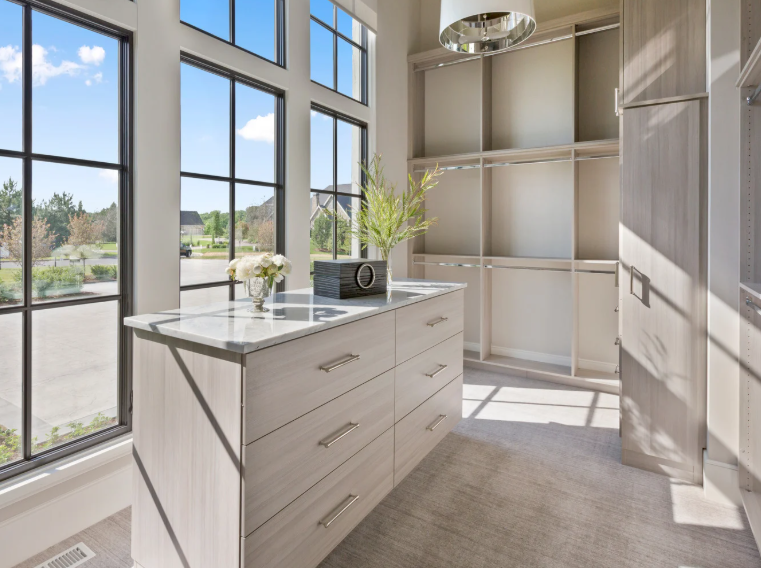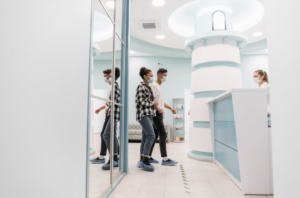
Modern homeowners demand storage solutions that combine practical organization with stunning visual appeal for their daily routines. Innovative walk-in closet design ideas today focus on creating boutique-style spaces that showcase clothing and accessories like luxury retail displays. These carefully planned layouts transform mundane storage areas into personal sanctuaries that make getting dressed a pleasure rather than a chore.
Growing Market Reflects Design Demand
This expansion reflects changing lifestyles where people value well-organized, beautiful spaces that support busy schedules. Urban living and smaller homes drive demand for storage systems that maximize every square inch while maintaining style.
Boutique-Style Presentation Zones
2025 design trends emphasize creating distinct merchandise zones within walk-in spaces. Presenting walk-in closet systems like a high-end boutique is the next big upcoming trend for 2025, involving thoughtfully curated zones for different clothing categories, accessories, and personal items.
Each zone serves specific storage needs while creating visual interest through varied heights, lighting, and display methods. Shoe galleries showcase footwear collections like museum exhibits. Handbag displays protect expensive accessories while keeping them easily accessible. Jewelry sections provide secure storage with clear visibility.
Material and Finish Trends
Contemporary closet design favors natural wood finishes that add warmth and texture to storage spaces. Grey-toned driftwood and bleached oak cabinetry pair beautifully with white walls. These organic materials create cozy atmospheres that feel more like luxury dressing rooms than basic storage areas.
White remains popular for its clean, bright appearance that makes spaces feel larger. Mixed materials combine wood warmth with metal accents for modern appeal. Fabric-lined drawers protect delicate items while adding textural interest to drawer interiors.
Smart Storage Solutions
Modular systems adapt easily to changing storage needs as wardrobes evolve. Pull-out drawers with soft-close mechanisms provide smooth operation and quiet function. Adjustable shelving accommodates varying item heights from shoes to sweaters.
Multiple hanging areas separate garments by length and type:
• Double-hang sections for shirts and pants
• Long-hang zones for dresses and coats
• Specialty racks for ties and belts
• Pull-down rods for high storage access
• Valet rods for outfit planning
Lighting Design Elements
Proper illumination transforms closets from dark storage caves into bright, welcoming spaces. LED strip lighting under shelves eliminates shadows while highlighting products. Pendant lights over islands provide task lighting for folding and organizing activities.
Natural light integration through skylights or windows creates pleasant morning routines. Motion sensors activate lighting automatically when entering spaces. Dimmer controls adjust brightness for different activities and times of day.
Island and Seating Features
Central islands provide folding surfaces, additional storage, and jewelry organization in larger walk-in spaces. Upscale walk-in closet designs now boast amenities like lighted display cases, makeup vanities, and comfortable lounge chairs for trying on shoes or planning outfits.
Built-in seating offers convenient spots for putting on shoes or contemplating outfit choices. Storage beneath benches holds seasonal items or exercise equipment. These comfort features elevate closets from purely functional to truly luxurious spaces.
Technology Integration
Modern closets incorporate smart features that enhance daily routines. Digital inventory systems track clothing items and suggest outfit combinations. Climate control maintains optimal humidity levels that protect fabrics and leather goods.
Automated carousel systems bring clothing to you at the touch of a button. Smart mirrors provide lighting adjustments and outfit photo capabilities. These technological advances transform morning routines while protecting valuable clothing investments.
Space Planning Strategies
Effective layouts begin with analyzing personal storage needs and daily habits. Frequently used items get prime real estate at eye level and easy reach. Seasonal clothing moves to higher or lower zones that require occasional access.
Traffic flow planning prevents bottlenecks during busy morning routines. Clear pathways allow two people to use larger spaces simultaneously. Strategic placement of mirrors creates illusions of expanded space while providing functional benefits.
Color Psychology Applications
Color choices influence mood and energy levels during daily dressing routines. Neutral palettes create calming environments that reduce morning stress. Bold accent colors add personality while maintaining sophisticated appeal.
Consistent color schemes throughout create cohesive looks that feel intentional rather than haphazard. Light colors reflect illumination better, making spaces feel brighter and more open. These psychological factors contribute to overall satisfaction with closet spaces.
Budget Optimization Tips
Start with basic organization systems then add luxury features over time. Focus initial spending on high-impact areas like eye-level displays and lighting upgrades. DIY installation of simple components reduces labor costs while professional installation handles complex elements.
Walk-in closets represent personal retreats that combine practical storage with luxurious design elements. Smart planning creates spaces that function beautifully while reflecting individual style preferences. These investments pay dividends through improved daily routines and increased home values.


